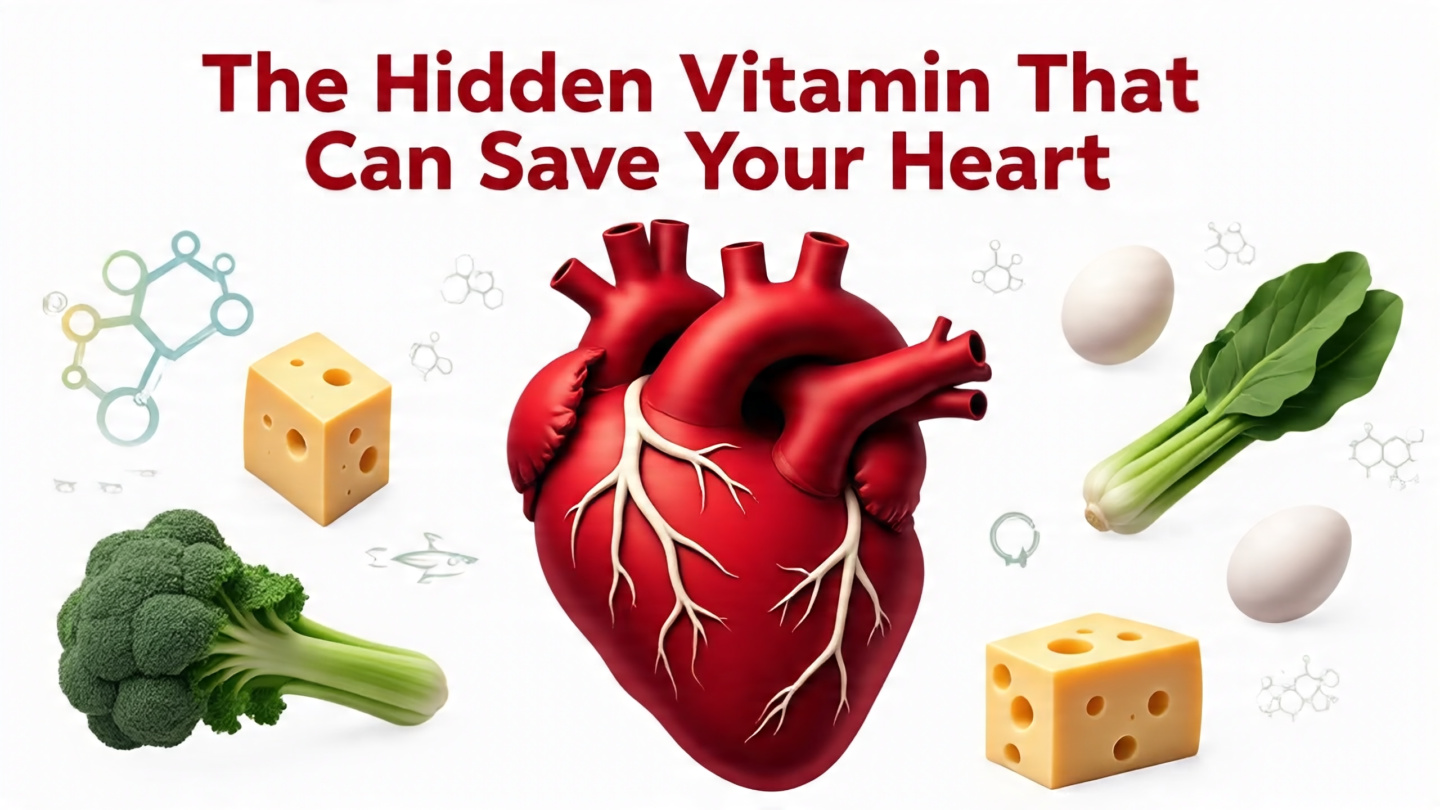The Silent Danger Inside Your Arteries
Heart disease is the number one cause of death worldwide, and the biggest culprit behind it is something most of us don’t even realize is building up inside us: arterial plaque. This sticky buildup of fat, cholesterol, and calcium silently narrows and hardens our arteries until one day it can trigger a heart attack or stroke.
Natural Way to Clean Blocked Arteries
But what if there was a natural way to stop plaque from forming—and even help keep your arteries clean and flexible? Recent research reveals a shocking connection between your gut health, a powerful but underrated vitamin, and your heart’s safety.
In this article, we’ll uncover:
-
What actually causes plaque in your arteries.
-
The surprising role of your gut microbiome.
-
The “hidden vitamin” K2 that can help protect your heart.
-
The best foods and lifestyle tips to naturally clean your arteries.
What is Arterial Plaque?
Arterial plaque is a mix of fat, cholesterol, and calcium particles that settle inside your blood vessels. Instead of flowing freely, these substances stick to the arterial walls and gradually narrow them. Over time, this condition—called atherosclerosis—makes it harder for your blood to circulate, increases your blood pressure, and raises your risk of a heart attack.
Several lifestyle factors make this process worse, including:
-
High blood pressure
-
Smoking
-
High cholesterol
-
Elevated blood sugar
All of these damage the inner lining of your arteries (the endothelium), creating the perfect environment for plaque buildup.
New Research: It’s Not Just About Cholesterol
For decades, we’ve been told that cholesterol alone is the enemy. But new scientific studies show the story is much more complex.
Researchers studied mice raised in a germ-free environment—completely sterilized from bacteria. While these mice survived, they experienced stunted growth and weak organ development. Even more alarming, when their gut microbiome (the “good bacteria” in the intestines) was disturbed, widespread inflammation spread through their bodies.
And what does inflammation do? It triggers plaque formation in arteries.
This means your gut health has a direct connection to your heart health.
The Gut–Heart Connection
Your intestines are home to trillions of bacteria, both friendly and unfriendly. The friendly microbes help you digest food, absorb nutrients, and even protect you from harmful bacteria. But when the balance shifts and harmful microbes take over, inflammation begins—and your arteries pay the price.
This imbalance in your microbiome is now being recognized as a major contributor to atherosclerotic plaque.
The Vitamin That Protects Your Arteries: K2
Here’s the exciting part: your friendly gut bacteria produce a vitamin that helps stop plaque from forming in your arteries. That vitamin is Vitamin K2.
While most people know about Vitamin K (from leafy greens), very few know about Vitamin K2. This nutrient is special because it helps regulate calcium in the body. Instead of letting calcium deposit inside your arteries, K2 directs it to your bones and teeth—where it belongs.
When you don’t get enough Vitamin K2, calcium builds up in your arteries, leading to hardening and blockages.
Where to Get Vitamin K2
Vitamin K2 isn’t found in all foods, which is why many people are deficient. The best natural sources include:
-
Leafy greens (indirectly, because bacteria convert Vitamin K to K2)
-
Cheese (especially aged varieties)
-
Egg yolks
-
Fish
-
Grass-fed meat (from animals raised naturally, not on processed feed)
Some supplements combine Vitamin D3 and K2, which is even more effective since both work together to strengthen bones and protect arteries.
Probiotics: Your Secret Weapon Against Plaque
It’s not just about what you eat—it’s also about the microbes living inside you. Probiotics (the good bacteria) play a huge role in preventing arterial hardening. They feed on the vegetables you eat, produce Vitamin K2, and help maintain a healthy balance in your gut.
By adding probiotic-rich foods like yogurt, kefir, sauerkraut, kimchi, and other fermented foods to your diet, you give your body a natural defense system against heart disease.
The Foods That Harm Your Arteries
If you want to protect your heart, you must avoid the foods that fuel inflammation and plaque buildup. These include:
-
Processed meats (sausages, deli meats)
-
Fast foods like pizzas, and burgers
-
Over-processed packaged foods loaded with chemicals
These foods disrupt your gut microbiome, reduce your Vitamin K2 levels, and accelerate arterial calcification.
The Foods That Heal Your Arteries
On the other hand, choosing whole, nutrient-rich foods can dramatically improve your artery health. Some of the best options include:
-
Leafy green vegetables (spinach, kale, broccoli)
-
Fermented foods (yogurt, kimchi, sauerkraut)
-
Cheese, eggs, and fish (for Vitamin K2)
-
Grass-fed meats
-
Nuts and seeds
-
Fresh fruits and vegetables from an organic source
If possible, try growing some of your own vegetables in a small kitchen garden. Not only will you avoid harmful pesticides, but you’ll also enjoy the freshest, most nutrient-dense food possible.
Testing for Artery Health
If you’re worried about arterial plaque, one test worth considering is the CAC (Coronary Artery Calcium) score. This non-invasive scan shows whether calcium has started building up in your arteries and can predict your risk of future heart problems.
Lifestyle Tips to Keep Arteries Clean Naturally
Beyond diet, here are additional habits that support artery health:
-
Quit smoking (it damages artery walls).
-
Exercise regularly to improve blood circulation.
-
Reduce stress with meditation or breathing exercises.
-
Get enough sleep to lower inflammation.
-
Stay hydrated to keep your blood flowing smoothly.
Conclusion: Protect Your Heart, Starting with Your Gut
The fight against heart disease isn’t just about lowering cholesterol—it’s about healing your gut, reducing inflammation, and giving your body the nutrients it needs to stay strong.
By focusing on whole foods, adding probiotics, and making sure you’re getting enough Vitamin K2, you can take a powerful step toward keeping your arteries clean and your heart healthy.
Remember, your health is in your hands—and sometimes, it’s the small hidden vitamins and tiny gut microbes that make the biggest difference.
References:
-
Geleijnse, J. M., Vermeer, C., Grobbee, D. E., Schurgers, L. J., Knapen, M. H., van der Meer, I. M., Hofman, A., & Witteman, J. C. (2004). Dietary intake of menaquinone is associated with a reduced risk of coronary heart disease: The Rotterdam Study. The Journal of Nutrition, 134(11), 3100–3105.
👉 Link -
Beulens, J. W., Bots, M. L., Atsma, F., Bartelink, M. L., Prokop, M., Geleijnse, J. M., & van der Schouw, Y. T. (2009). High dietary menaquinone intake is associated with reduced coronary calcification. Atherosclerosis, 203(2), 489–493.
👉 Link -
Fusaro, M., Gallieni, M., Porta, C., Nickolas, T. L., Khairallah, P., & Jimenez, J. (2020). Vitamin K and bone. Clinical Cases in Mineral and Bone Metabolism, 17(2), 100–106.
👉 Link -
Willems, B. A., Vermeer, C., Reutelingsperger, C. P., & Schurgers, L. J. (2014). The realm of vitamin K dependent proteins: shifting from coagulation toward calcification. Molecular Nutrition & Food Research, 58(8), 1620–1635.
👉 Link -
Tang, W. H. W., Kitai, T., & Hazen, S. L. (2017). Gut microbiota in cardiovascular health and disease. Circulation Research, 120(7), 1183–1196.
👉 Link
- 10 Best Protein Foods for Muscle Growth - 19 September 2025
- The Hidden Vitamin That Can Save Your Heart - 21 August 2025
- Flax Seed in Urdu السسی کے فائدے - 8 July 2025










